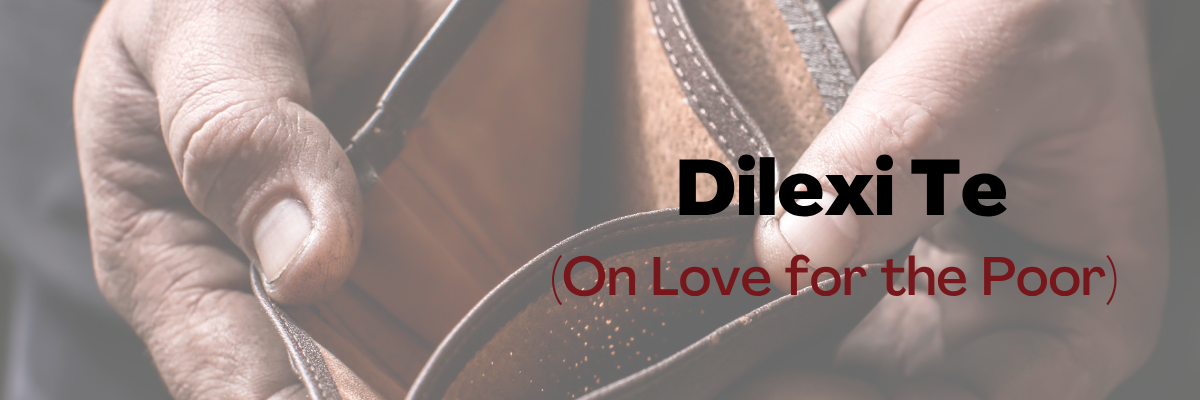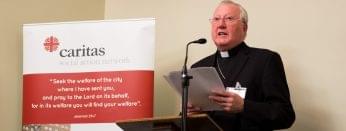On 4 October 2025, the Memorial of St Francis of Assisi, Pope Leo XIV issued the first Apostolic Exhortation of his Pontificate, Dilexi Te (On Love for the Poor).
The document acknowledges that Pope Francis had been working on an Apostolic Exortation at the time of his death, to which he gave the title, Dilexi Te (the first words of the text in Latin, meaning, “I have loved you”). Pope Leo has made the document his own, adding some reflections, in a clear sign of continuity with the Pontificate of Pope Francis.
The underpinning theology of the document is that “Love for the Lord is one with love for the poor” (#5). Those who are made poor are not just a societal problem, but a revelation of the presence of Christ in history and a path to holiness: “Just as you did it to the least of these brothers and sisters of mine, you did it to me” (Mt 25:40).
Eight centuries ago, St Francis of Assisi was converted from a life of luxury and privilege by his direct contact with Christ in the the poor. Pope Leo is “convinced that the preferential choice for the poor is a source of extraordinary renewal for the Church and for society, if only we can set ourselves free of our self-centredness and open our hearts to their cry” (#7).
The document describes many forms of poverty in today’s world. In addition to material poverty, there is “moral and spiritual poverty, cultural poverty, the poverty of those who find themselves in a condition of personal and social weakness or fragility, the poverty of those who have no rights, no space, no freedom” (#9).
Pope Leo continues the teaching of his predecessor on the damaging effects of consumerism, the vision of life “centred on the accumulation of wealth and social successes” (#11) at the expense of others, taking advantage of “unjust social ideals and political-economic systems that favour the strongest” (#11).
He responds strongly to those who ridicule or dismiss charitable works, as if they were the obsession of a few, “not the beating heart of the Church’s mission” (#15). Pope Leo, like Pope Francis, sends us back to the Gospel, “less we risk replacing it with the wisdom of this world” (#15).
The document has a number of challenges for the Church, not just for the charities and agencies dedicated to social action for justice. Building on the recent Magisterium, the document insists on a “privileged place” (#21) in the Church for the poor, an end to the paternalism that regarded the poor as objects of our charity, not “subjects capable of creating their own culture” (#100). This approach calls for developing social projects with and of those who are poor, not just for the poor. What this “privileged place” in the Church looks like for those who are poor is a challenge requiring sustained attention.
While the document acknowledges the need for almsgiving to meet the immediate needs of those who are suffering, we are called “to be increasingly committed to resolving the structural causes of poverty” (#94). To look upstream, so to speak, to find out the reasons for suffering and work to change them.
To do this, the Church needs the help of people of goodwill working in the field of justice, who have developed the tools and training to form people as agents of change who can build relational power in communities, understand the mechanisms of change and how to campaign to bring about a more just social order, called for by Pope Leo XIII in Rerum Novarum in 1891.
Pope Leo XIV, taking his cue from Pope Francis, calls these grass roots organisations, the popular movements. In England and Wales, Citizens UK is perhaps the best known of the popular movements working with the Church in many dicoeses and schools. These movements show us how to fight against the structural causes of poverty and inequality, how to do justice. They bring a “moral energy that springs from including the excluded in the building of a common destiny” (#81).
We are being called to prophetic boldness, ‘we’ as in “all the members of the People of God [who] have a duty to make their voices heard” (#97), even at the risk of appearing foolish or naïve. The document has a warning for those in the Church whose strategy is to work with the elite, “to cultivate relationships that bring us security and a position of privilege” (#114). This is a worldly approach, “lacking any light from above” (#114).
We are called to “denounce the dictatorship of an economy that kills” (#92), to challenge the exponential rise of inequality resulting from ideologies which promote the absolute autonomy of the marketplace, undermining the common good, and work towards an economy of solidarity.
Archbishop Emeritus Malcolm McMahon, the Chair of CSAN, commented, “We welcome the encouragement in Dilexi Te to make a radical and decisive choice in favour of the weakest. This is the Gospel imperative which inspires the work of the member organisations of CSAN. In addition to the work of charity, we will continue to work for justice, challenging the structures of sin which prevent people from living a dignified life.”
Raymond Friel OBE
CEO, Caritas Social Action Network
For CSAN’s latest Calls to Action visit: https://www.csan.org.uk/news/calls-to-action-october-2025/
For more information on Dilexi Te, including a synthesis and infographics, visit: https://www.humandevelopment.va




